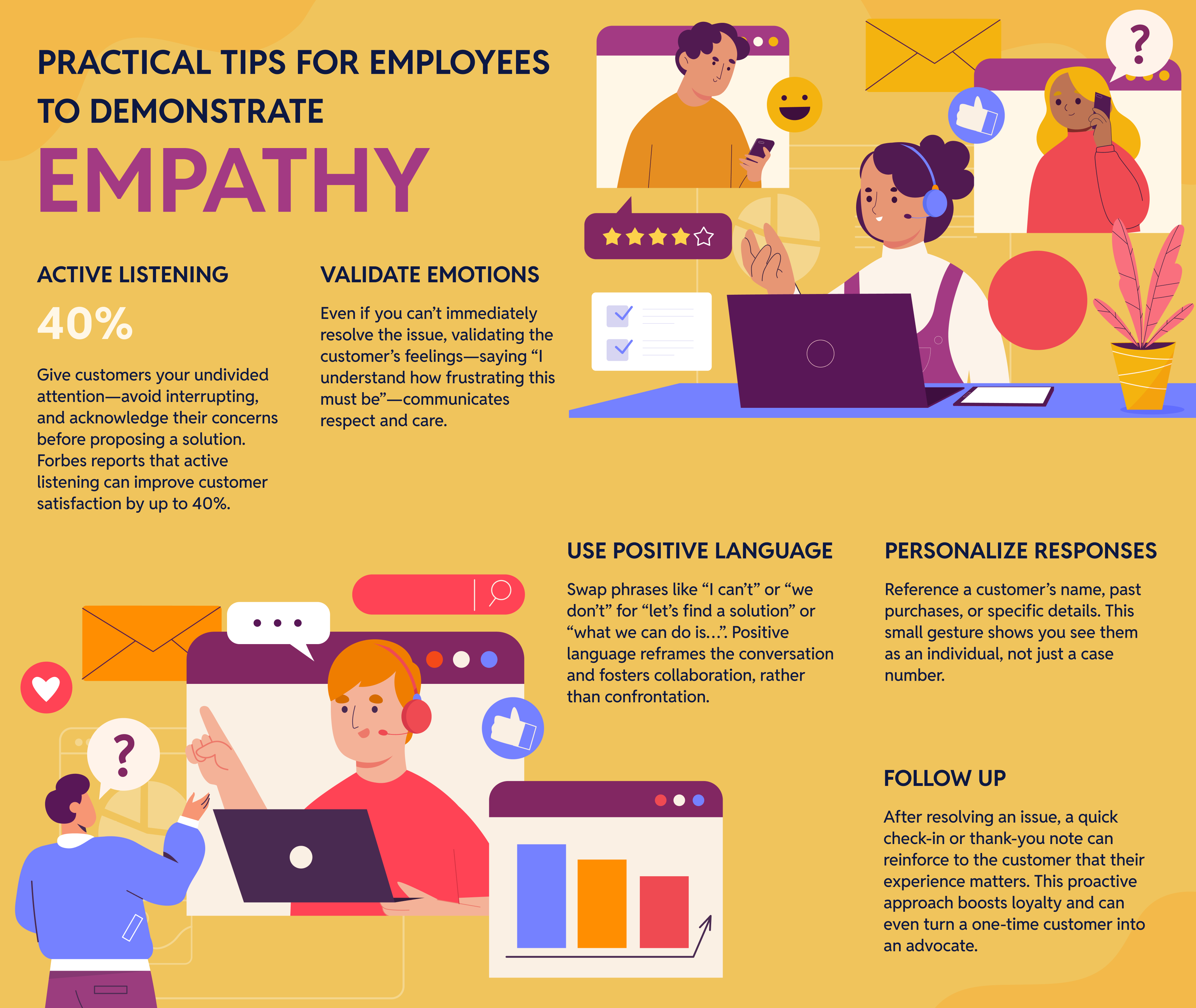In an era where customers demand more than just efficiency, empathy has emerged as the cornerstone of meaningful and lasting customer relationships. According to research by PwC, 59% of U.S. consumers say companies have lost touch with the human element of customer experience, and 86% of buyers are willing to pay more for a better customer experience¹. These figures underscore the fact that beyond transactional interactions, customers crave emotional understanding and genuine care. When executed effectively, empathy not only transforms customer experiences but also drives long-term loyalty and revenue growth.
In this article, we’ll explore why empathy matters, provide practical tips for employees, and show how XMC360 helps businesses embed empathy into every customer interaction.
Why Empathy Matters in Customer Service

Fosters Trust and Loyalty
Empathy creates an emotional bond. When customers feel truly heard and understood, they’re more inclined to stay loyal. According to a Salesforce survey, 89% of consumers say a positive customer service experience significantly increases their likelihood of repurchasing².

Differentiates Your Brand
In a competitive market, empathy can serve as a key distinguishing factor. Companies that consistently demonstrate empathy stand out from competitors who may prioritize speed or cost over emotional intelligence.

Improves Conflict Resolution
Empathetic listening often de-escalates tense situations. When employees respond calmly and show genuine concern, frustrated customers are more willing to collaborate on a solution rather than escalating their complaints.


Practical Tips for Employees to Demonstrate Empathy

Active Listening
Give customers your undivided attention—avoid interrupting, and acknowledge their concerns before proposing a solution. Forbes reports that active listening can improve customer satisfaction by up to 40%³.

Validate Emotions
Even if you can’t immediately resolve the issue, validating the customer’s feelings—saying “I understand how frustrating this must be”—communicates respect and care.

Use Positive Language
Swap phrases like “I can’t” or “we don’t” for “let’s find a solution” or “what we can do is…”. Positive language reframes the conversation and fosters collaboration, rather than confrontation.

Personalize Responses
Reference a customer’s name, past purchases, or specific details. This small gesture shows you see them as an individual, not just a case number.

Follow Up
After resolving an issue, a quick check-in or thank-you note can reinforce to the customer that their experience matters. This proactive approach boosts loyalty and can even turn a one-time customer into an advocate.
How Empathy Fosters Loyalty
Empathy sets the stage for long-term loyalty by showing customers that their experiences are genuinely important. A study by Qualtrics found that 60% of customers who receive empathetic service are more likely to remain loyal for an extended period⁴. When customers trust that a brand cares about their well-being, they’re not just likely to make repeat purchases—they also become vocal supporters, leaving positive reviews and recommending the company to others.
The impact of loyalty extends beyond immediate sales. Loyal customers often serve as brand ambassadors, sharing personal endorsements that carry far more weight than any advertising campaign. These positive word-of-mouth recommendations can lead to a surge in new customers, fueling steady growth and heightened brand reputation.
How XMC360 Encourages Empathy in Customer Interactions
At XMC360, we believe that empathy and efficiency can coexist, enhancing the overall customer journey. Our platform combines data-driven insights with customer engagement tools, enabling employees to:
Access Comprehensive Customer Profiles
By integrating data from multiple channels, XMC360 offers a 360-degree view of each customer’s history, preferences, and past interactions. This allows employees to tailor their tone and approach for a more personal touch.
Use Real-Time Sentiment Analysis
With AI-powered sentiment tracking, employees can gauge a customer’s emotional state and adjust their responses accordingly. This proactive tool helps calm tense situations before they escalate.
Collaborate Seamlessly
XMC360’s unified interface ensures that all departments (e.g., support, sales, marketing) share a single source of truth. Employees can quickly reference past solutions or best practices to address complex customer issues empathetically.
Offer Timely Follow-Ups
Automated reminders and workflows ensure that even after an issue is “resolved,” a follow-up is triggered to confirm customer satisfaction, reinforcing a culture of genuine care.

By merging empathy with actionable insights, XMC360 helps businesses create stronger emotional connections—leading to higher satisfaction rates and more enduring customer relationships.
Empathy in action is more than just a buzzword; it’s a strategic imperative in a marketplace where emotional connections often trump even the most compelling product features. By actively listening, validating emotions, and delivering personalized solutions, employees can turn challenging interactions into opportunities to deepen trust and loyalty. Meanwhile, companies that systemically support empathetic interactions—through tools like XMC360—stand to gain an edge in customer satisfaction, retention, and overall brand reputation.
References:
- PwC. (2018). Experience is everything: Here’s how to get it right.
- Salesforce. (2021). State of the Connected Customer.
- Forbes. (2020). Improving Customer Satisfaction with Active Listening.
- Qualtrics. (2019). Global Consumer Study: The Value of Empathy in Service.


